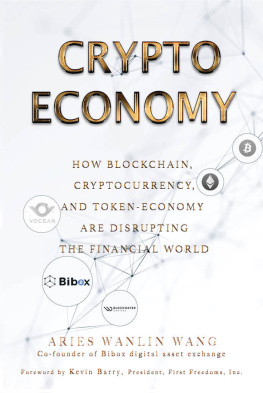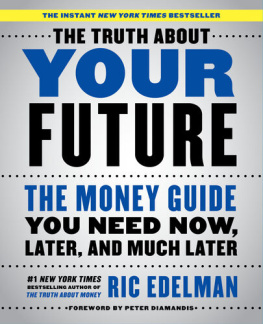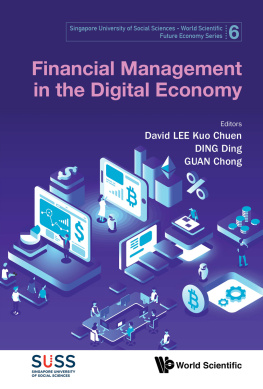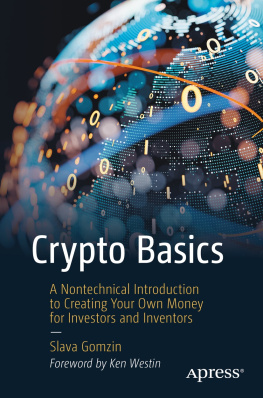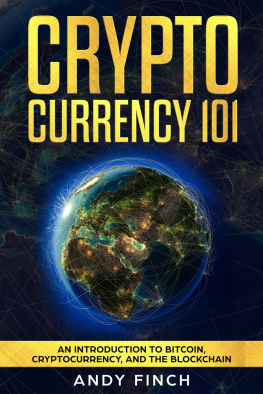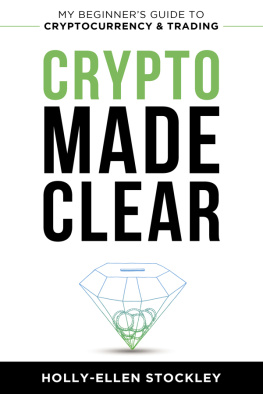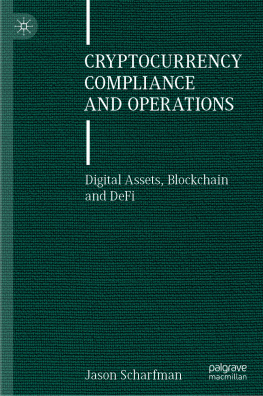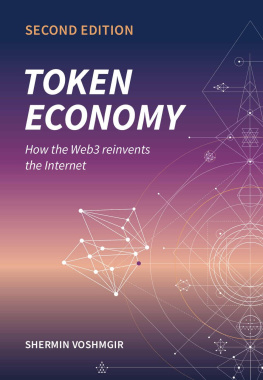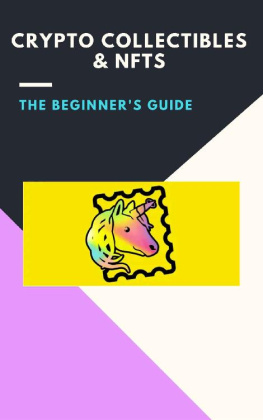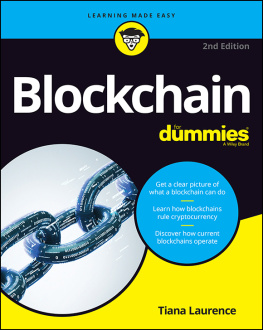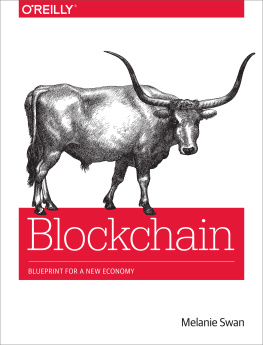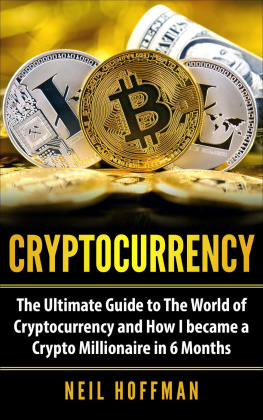Wanlin Aries Wang - Crypto Economy: How Blockchain, Cryptocurrency, and Token-Economy Are Disrupting the Financial World
Here you can read online Wanlin Aries Wang - Crypto Economy: How Blockchain, Cryptocurrency, and Token-Economy Are Disrupting the Financial World full text of the book (entire story) in english for free. Download pdf and epub, get meaning, cover and reviews about this ebook. year: 2018, publisher: Skyhorse Publishing, genre: Romance novel. Description of the work, (preface) as well as reviews are available. Best literature library LitArk.com created for fans of good reading and offers a wide selection of genres:
Romance novel
Science fiction
Adventure
Detective
Science
History
Home and family
Prose
Art
Politics
Computer
Non-fiction
Religion
Business
Children
Humor
Choose a favorite category and find really read worthwhile books. Enjoy immersion in the world of imagination, feel the emotions of the characters or learn something new for yourself, make an fascinating discovery.
- Book:Crypto Economy: How Blockchain, Cryptocurrency, and Token-Economy Are Disrupting the Financial World
- Author:
- Publisher:Skyhorse Publishing
- Genre:
- Year:2018
- Rating:3 / 5
- Favourites:Add to favourites
- Your mark:
- 60
- 1
- 2
- 3
- 4
- 5
Crypto Economy: How Blockchain, Cryptocurrency, and Token-Economy Are Disrupting the Financial World: summary, description and annotation
We offer to read an annotation, description, summary or preface (depends on what the author of the book "Crypto Economy: How Blockchain, Cryptocurrency, and Token-Economy Are Disrupting the Financial World" wrote himself). If you haven't found the necessary information about the book — write in the comments, we will try to find it.
Wanlin Aries Wang: author's other books
Who wrote Crypto Economy: How Blockchain, Cryptocurrency, and Token-Economy Are Disrupting the Financial World? Find out the surname, the name of the author of the book and a list of all author's works by series.
Crypto Economy: How Blockchain, Cryptocurrency, and Token-Economy Are Disrupting the Financial World — read online for free the complete book (whole text) full work
Below is the text of the book, divided by pages. System saving the place of the last page read, allows you to conveniently read the book "Crypto Economy: How Blockchain, Cryptocurrency, and Token-Economy Are Disrupting the Financial World" online for free, without having to search again every time where you left off. Put a bookmark, and you can go to the page where you finished reading at any time.
Font size:
Interval:
Bookmark:


Copyright 2018 by Aries Wanlin Wang
Foreword 2018 by Kevin Barry
All rights reserved. No part of this book may be reproduced in any manner without the express written consent of the publisher, except in the case of brief excerpts in critical reviews or articles. All inquiries should be addressed to Racehorse Publishing, 307 West 36th Street, 11th Floor, New York, NY 10018.
Racehorse Publishing books may be purchased in bulk at special discounts for sales promotion, corporate gifts, fund-raising, or educational purposes. Special editions can also be created to specifications. For details, contact the Special Sales Department, Skyhorse Publishing, 307 West 36th Street, 11th Floor, New York, NY 10018 or .
Racehorse Publishing is a pending trademark of Skyhorse Publishing, Inc., a Delaware corporation.
Visit our website at www.skyhorsepublishing.com.
10 9 8 7 6 5 4 3 2 1
Library of Congress Cataloging-in-Publication Data is available on file.
Cover design by Kaili Zhang
ISBN: 9781-5107-4482-0
Ebook ISBN: 9781-5107-4483-7
Printed in the United States of America
C ONTENTS
F OREWORD
by Kevin Barry, CEO of Myntum Limited
Nothing is more powerful than an idea whose time has come.
Victor Hugo
W e are at a turning point in worldwide financial transactions. Who will embrace change and who will be left behind? Decentralization, trust, privacy, and democratization of financial transactions are all ideas whose time has come. Blockchain technology will certainly drive these ideas over the next few years; the question is: Where will this happen? Some governments will embrace the technology of the future and others will resist, steadfastly clinging to the status quo. Who wins and who loses?
In Crypto Economy: How Cryptocurrency, Blockchain, and Token Economy Are Disrupting the Financial World , Aries Wanlin Wang expertly describes how this revolutionary new economy will function. As an insider who cofounded exchanges and has functioned successfully in the crypto economy over many years, he is the ultimate guide to this sometimes confusing new economy. Readers will no doubt benefit from his perspective and understanding of the concerns and motives of the people who make the economy work.
Through my varied professional experiences, I have insight into the concerns and motivations of various nations and regulators to this new technology. As a representative of a Nongovernmental Organization (NGO) at the United Nations in New York City, I have heard the concerns of technology and information ministers from multiple countries all around the world. I am formerly an attorney for the United States government, so I have insight into how government regulators react when faced with new technologies. I am also the CEO of a startup company called Myntum Limited, which is building online vaults to secure critical digital assets (including cryptocurrencies and tokens). For this reason, I have been closely following developments in the crypto economy for the past two years. Finally, I am the founder of a nonprofit organization called First Freedoms, which advances the five freedoms listed in the First Amendment to the United States Constitution (freedoms of religion, speech, press, assembly, and redress of grievances). What is the link between the First Amendment and crypto economy?
Both have their foundation in freedom. In the late 18th century, the ideas and ideals of the First Amendment became part of the bedrock of the USs emphasis on individual freedom. Now is the time for the ideas and ideals of blockchain and the crypto economy. And yet there are still questions that remain, which must ultimately be addressed:
Decentralization or centralization?
Trust between parties or a Third Party to ensure trust?
Transparency of transactions or hidden and opaque transactions?
A borderless world with less political influence or a bordered world with more political influence?
Crowdfunding for new businesses or only venture capital, investment banks, and governments?
These are only a few of the ideas citizens, businesses, and government regulators will have to sort out.
How do governments make decisions on new technology? In general, governments have three options: support, oppose, or no position. The crypto economy desires support or neutral positions from governments. To accomplish this, most people in the crypto economy know they need to work with governments in various jurisdictions to enact smart regulation to help make the new economy thrive. Working with friendly jurisdictions to make the new crypto economy thrive also allows for the possibility of convincing governments that oppose it to change their policy.
So, decentralization or centralization? For centuries, financial transactions have required centralized banks or financiersnational banks, commercial banks, credit card issuersto act as trusted Third Parties to facilitated transactions between two parties. Until blockchain technology arrived in 2008, no one had developed a sound and safe way to bypass the banks. With blockchain technology, individuals and businesses for the first time have the power to deal directly with each other. This sounds ideal, but there are important issues to work out, and I believe that sometimes involving a trusted Third Party is a good choice.
Trust between parties or requiring a Third Party to ensure trust? The crypto economy provides individuals and businesses the option to either deal directly with each other or to deal in the traditional fiat currency economy involving a Third Party. I believe the future of cryptocurrency acceptance will involve crypto being used for relatively small purchases and fiat currency being used for relatively large purposes. At this time, there is no good method of dispute resolution in the cryptocurrency markets. There is no crying in crypto. If a transition goes badly, there is no one to complain to. In which jurisdiction would you file a complaint? I believe in the near future those involved in large transactions will continue use the traditional economy, but this is still good news for crypto! Most of the routine transactions every day are small transactions that are perfect for cryptocurrencies.
Transparency of transactions or hidden or opaque transactions? Cryptocurrency transactions are transparent on a public ledger for the world to see. Each Bitcoin can only be used once. This is a radical departure from the fiat traditional economy, which uses the same dollar multiple times. The brilliant Ray Dalio of Bridgewater Associates described this in 2014 in How the Economic Machine Works:
Virtually all of what the Federal Reserve calls money is credit (i.e., promises to deliver money) rather than money itself. The total amount of debt in the US is about $50 trillion and the total amount of money (i.e., currency and reserves) in existence is about $3 trillion. So, if we were to use these numbers as a guide, the amount of promises to deliver money (i.e., debt) is roughly 15 times the amount of money there is to deliver.
As long as the gears of this economic machine are turning, the music is playing and there is no one scrambling for a seat in musical chairs. But if and when the music stops, there are fifty people fighting over three seats. This is what happens in economic crises. Because each Bitcoin can only be used once, this type of problem cannot happen.
A borderless world with less political influence or a bordered world with more political influence? Im an idealist. I am very much drawn to the idea of a borderless world. Technology is borderless. Financial transactions in theory can be borderless. In the traditional fiat economy and in the crypto economy, assets can be sent anywhere at the click of a mouse. This is not the reality, however. Governments sometimes get into disagreements and sanction one another and prohibit their citizens from doing business with one another. Businesses and individuals should absolutely respect the sanctions that their countries impose. A simple business principle? Respect and honor any regulator who can close you, litigate and fine you out of existence, or put you in prison.
Font size:
Interval:
Bookmark:
Similar books «Crypto Economy: How Blockchain, Cryptocurrency, and Token-Economy Are Disrupting the Financial World»
Look at similar books to Crypto Economy: How Blockchain, Cryptocurrency, and Token-Economy Are Disrupting the Financial World. We have selected literature similar in name and meaning in the hope of providing readers with more options to find new, interesting, not yet read works.
Discussion, reviews of the book Crypto Economy: How Blockchain, Cryptocurrency, and Token-Economy Are Disrupting the Financial World and just readers' own opinions. Leave your comments, write what you think about the work, its meaning or the main characters. Specify what exactly you liked and what you didn't like, and why you think so.

